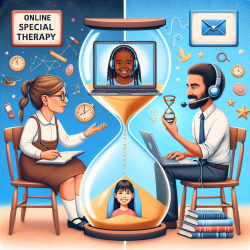Introduction
As practitioners dedicated to fostering positive outcomes for children, it is crucial to leverage research to enhance our approaches. A recent study titled "Examining Reciprocal Links between Parental Autonomy-Support and Children’s Peer Preference in Mainland China" offers valuable insights into the interplay between parental autonomy-support and children's peer relationships. This blog will delve into the study's findings and discuss how practitioners can apply these insights to improve their practice.
Understanding Parental Autonomy-Support
Parental autonomy-support refers to practices that allow children to make appropriate choices, express themselves, and understand the reasons behind rules. These practices are rooted in Self-Determination Theory (SDT), which posits that autonomy-supportive parenting fosters children's independence, competence, and relatedness. These characteristics are crucial for social functioning and establishing positive relationships.
Key Findings from the Study
The study followed 758 children from Grades 4-6 to Grades 6-8 in Shanghai, China, over three years. Each year, children reported their perceived maternal and paternal autonomy-support, and peer preference was measured via peer nominations. The key findings include:
- Peer preference positively predicted later perceptions of maternal and paternal autonomy-support.
- Autonomy-supportive parenting did not significantly predict later peer preference.
These findings suggest that children who are well-liked by their peers tend to perceive higher levels of autonomy-support from their parents over time.
Implications for Practitioners
Practitioners can draw several actionable insights from this study to improve their practice:
1. Focus on Enhancing Peer Relationships
Given that peer preference influences perceptions of parental autonomy-support, practitioners should prioritize interventions that enhance children's social skills and peer relationships. Activities that promote teamwork, empathy, and communication can be particularly effective.
2. Educate Parents on the Importance of Autonomy-Support
Practitioners should educate parents about the benefits of autonomy-supportive practices. Providing parents with strategies to encourage their children's autonomy, such as offering choices and explaining the reasons behind rules, can foster a supportive home environment.
3. Cultural Sensitivity
The study highlights the importance of cultural context in parenting practices. Practitioners should be culturally sensitive and consider how cultural values influence parenting and child development. In Chinese culture, for example, social harmony and interdependence are highly valued, which may affect how autonomy-support is perceived and practiced.
Encouraging Further Research
While this study provides valuable insights, it also raises questions about the generalizability of these findings to other cultural contexts and age groups. Practitioners are encouraged to engage in further research to explore these dynamics in different settings and with diverse populations.
Conclusion
Understanding the reciprocal relationship between parental autonomy-support and children's peer relationships can help practitioners create more effective interventions. By focusing on enhancing peer relationships and educating parents on autonomy-supportive practices, practitioners can foster positive outcomes for children. To read the original research paper, please follow this link: Examining Reciprocal Links between Parental Autonomy-Support and Children’s Peer Preference in Mainland China.










